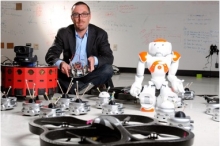MAE Seminar: Constraint-Based Control Design for Long Duration Autonomy - Magnus Egerstedt

Stacey Nicholas Dean of Engineering, Samueli School of Engineering
UC Irvine
Abstract: When robots are to be deployed over long time scales, optimality should take a backseat to “survivability,” i.e., it is more important that the robots do not break or completely deplete their energy sources than that they perform certain tasks as effectively as possible. For example, in the context of multi-agent robotics, we have a fairly good understanding of how to design coordinated control strategies for making teams of mobile robots achieve geometric objectives, such as assembling shapes or covering areas. But, what happens when these geometric objectives no longer matter all that much? In this talk, we consider this question of long duration autonomy for teams of robots that are deployed in an environment over a sustained period of time and that can be recruited to perform a number of different tasks in a distributed, safe and provably correct manner. This development will involve the composition of multiple barrier certificates for encoding tasks and safety constraints through the development of non-smooth barrier functions, as well as a detour into ecology as a way of understanding how persistent environmental monitoring can be achieved by studying animals with low-energy life-styles, such as the three-toed sloth.
Bio: Magnus Egerstedt is the Stacey Nicholas Dean of Engineering in the Samueli School of Engineering and a professor in the Department of Electrical Engineering and Computer Science at UC Irvine. Prior to joining UCI, Egerstedt was on the faculty at the Georgia Institute of Technology, serving as the chair of the School of Electrical and Computer Engineering and the director of Georgia Tech's Institute for Robotics and Intelligent Machines. He received an M.S. in engineering physics and a Ph.D. in applied mathematics from the Royal Institute of Technology, Stockholm, Sweden, a B.A. in philosophy from Stockholm University, and was a postdoctoral scholar at Harvard University. Egerstedt conducts research in the areas of control theory and robotics, with particular focus on control and coordination of multi-robot systems. Egerstedt is a fellow of IEEE and IFAC, and is a foreign member of the Royal Swedish Academy of Engineering Science. He has received a number of teaching and research awards, including the Ragazzini Award from the American Automatic Control Council, the O. Hugo Schuck Best Paper Award from the American Control Conference, the Outstanding Doctoral Advisor Award and the HKN Outstanding Teacher Award from Georgia Tech, and the Alumni of the Year Award from the Royal Institute of Technology.
Share
Upcoming Events
-
EECS 294 Seminar: Programming Light Diffraction for Information Processing and Computational Imaging
-
MAE 298 SEMINAR: Stretchable Electronics for Soft Biological and Robotic Systems
-
CBE Distinguished Lecture/CBE 298 Seminar: Computational Design of Peptides as Detectors, Sensors and Drugs
-
MSE 298 Seminar: Molecular Modeling in the Age of AI - From Energy Materials to Device Simulations
-
CBE 298 Seminar: Metal Electrodeposition for Modern Mineral Refining
